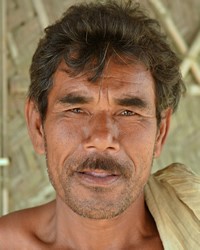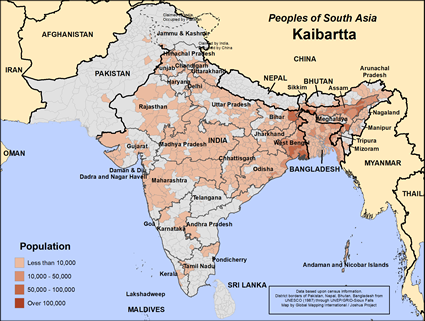The Kaibartta people's primary occupation has been that of fishermen since their earliest days. In fact, their name may have originated from the words "ka", which means water, and "varta" meaning livelihood. Thus, the name of the people group communicates that their livelihood is dependent upon water. Their occupations can serve as a natural bridge to messages of the Bible that speak of fish and fishermen. Jesus called some fishermen to become his evangelistic disciples, and thus fishers of men. Kaibartta live throughout India. Most live in the northeastern states of Assam, West Bengal and Bihar. Bengali, Assamese and Hindi are their main languages. The Kaibartta speak the local languages of where they live. Unfortunately, most Kaibartta are unable to read and write meaning that the gospel will have to be shared with them in oral and visual forms.
Higher caste Indians tend to look down on the Kaibartta due to their illiteracy and poverty. India has numerous castes and some people view the Kaibartta as one of the lowest castes or even outside the caste system. The Kaibartta women do not participate in political or religious activities. Elders make judicial decisions in their communities. Thus, Christians should share the gospel through the men before they do so with the women. Most Kaibartta live in rural villages near bodies of water. These villages often lack access to clean water, electricity and modern medicine. Some Kaibartta have moved to cities hoping the find a better life. Due to their lack of literacy and job skills, the Kaibartta have to take urban jobs that higher caste Indian will not take.
Underneath the veneer of Hinduism, the Kaibartta believe in the existence of spirits and, therefore, are rightly considered by some to be animists.
The Kaibartta are a Hindu people. Their brand of Hinduism is heavily influenced by folk religion. They recognize the existence of the Hindu gods, and even lay claim to one - Vasuli Devi - as their primary Hindu god. Yet, underneath the veneer of Hinduism, the Kaibartta also believe in the existence of evil spirits in nature, and therefore, are rightly considered by some to be animists. The Kaibartta are more fervent in their animistic beliefs than for orthodox Hinduism. Yet, their fervency for Vasuli Devi as well as other spirits ought to suggest that the presentation of the gospel ought to begin with a recognition of spirits and an introduction to the Supreme God of the Bible over these spirits. The Kaibartta dance to show their devotion to Vasuli Devi, their patron god in a yearly April festival. One male and one female dress in colorful attire and sing and dance around a wooden or bamboo horse, which is a symbol of Vasuli Devi. Another dance that is near to the affections of the Kaibartta is a dance that worships boats. The Kaibartta enjoy this dance so much because it does not require the presence of a Brahmin to perform, but also because their main occupation is fishing.
The Kaibartta face illiteracy, economic deprivation and the legal loss of their fishing rights. Higher caste Hindus are attempting to claim fishing rights over certain rivers and lakes that have belonged to the Kaibartta. Most of all the Kaibartta need to hear and understand the gospel of Jesus Christ. He alone can forgive their sins and grant them eternal life.
Ask the Lord to deepen the spiritual walk of known Kaibartta believers and lead them to share the gospel with their families and neighbors. Ask the Lord to raise up trained pastors and Bible teachers among the Kaibartta to lead their believers into spiritual maturity. Pray that Kaibartta parents are able to provide adequately for their children. Pray for a disciple making movement to Christ among the Kaibartta this decade.
Scripture Prayers for the Kaibartta unspecified in India.
| Profile Source: Keith Carey |











